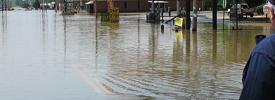April 16, 2024
More than 80 years after the iconic Xerces Blue butterfly vanished from San Francisco, researchers have analyzed century-old specimens of the butterfly to track down its closest living relative, the Silvery Blue. Last week, they released a handful of Silvery Blues on the western edge of the city, where Xerces Blues once thrived.
April 15, 2024
In a South Pacific nation ravaged by logging, several tribes joined together to sell “high integrity” carbon credits on international markets. The project not only preserves their highly biodiverse rainforest, but it funnels life-changing income to Indigenous landowners.
April 12, 2024
An extensive analysis of satellite imagery has uncovered thousands of miles of unmapped roads slicing through Asia's tropical rainforests.
April 11, 2024
Marine biologist Christine Figgener gained global attention with a video showing her removing a plastic straw from the nostril of a sea turtle. With these ancient reptiles now threatened worldwide, she says we must develop science-based approaches to protect them.
April 10, 2024
Many of the biggest and richest businesses on Earth are coming up short in their efforts to tackle climate change, a new report finds.
April 9, 2024
Albania’s Vjosë River is known as Europe’s last wild river, and its pristine delta is a haven for migratory birds. As plans for luxury developments there — spearheaded by Donald Trump’s son-in-law Jared Kushner — move ahead, conservationists are sounding the alarm.
April 8, 2024
Smugglers are illegally moving refrigerants into Europe that, when leaked from air conditioners and refrigerators, pose a significant threat to the climate.
April 5, 2024
The eleventh annual Yale Environment 360 Film Contest is now accepting entries.
April 4, 2024
A push for nuclear power is fueling demand for uranium, spurring the opening of new mines. The industry says new technologies will eliminate pollution from uranium mining, but its toxic legacy, particularly in the U.S. Southwest, leaves many wary of an incipient mining boom.
April 3, 2024
This month will see swarms of big, noisy, chirping cicadas begin to emerge in the U.S. as two large broods take flight at the same time.
April 2, 2024
When a governing body of the International Union of Geological Sciences voted down a proposal to name a new epoch in Earth’s history, it ignored conclusive evidence that for the first time, a single species — humans — has fundamentally altered the planet.
April 1, 2024
Long-buried bombs leftover from World War I and World War II have become more volatile, a new study finds, raising the odds that a dormant explosive detonates.
March 29, 2024
The Earth is spinning slightly faster than it was a few years ago, but the rapid melt of polar ice is keeping that acceleration in check, with consequences for timekeeping, a new study finds.
March 28, 2024
Sonam Wangchuk has long worked to help people in India’s Ladakh region adapt to climate change. In an e360 interview, he explains why he fasted for 21 days to pressure the government to grant legal protections to the region’s fragile ecosystem and its life-giving glaciers.
March 27, 2024
Though oft touted as a fix for climate change, planting trees could, in some regions, make warming more severe, a new study finds.
March 26, 2024
A Spanish company is aiming to factory farm octopuses for their meat, contending that it would help conserve the creatures in the wild. But critics argue that caging these highly sensitive mollusks, whose intelligence science is still revealing, would be cruel and inhumane.
March 25, 2024
While forest managers have proved adept of stamping out small wildfires, they have been less successful at suppressing larger, more devastating burns. The result is that the average wildfire is more severe than it would be without human intervention.
March 22, 2024
A new study of summer weather in Texas finds the heat index — an indicator of how hot it feels outside — is rising much faster than the temperature.
March 21, 2024
Because of lax rules, national inventories reported to the United Nations grossly underestimate many countries’ greenhouse gas emissions. The result, analysts say, is that the world can not verify compliance with agreed emissions targets, jeopardizing global climate agreements.
March 20, 2024
Aided by tax breaks and carbon credits, scores of plants are being developed or now operating that remove CO2 from the air. Such facilities are considered necessary to limit global warming, but critics have questions about the high costs and where the captured carbon will go.
March 19, 2024
A new study of urban transport finds that most commuters globally are getting to work by car, fueling pollution, particularly in wealthier regions.
March 18, 2024
A new study finds that scaling back grazing on most pastureland worldwide would dramatically increase the amount of carbon stored in soils.
March 15, 2024
Over the past two decades, the number of young bull sharks in Mobile Bay, Alabama has multiplied fivefold, a new study finds.
March 14, 2024
Worsening drought and wildfires in California are pushing giant sequoias, the biggest trees on Earth, into decline. But sequoias that have been planted in Britain are flourishing, new research finds.
March 13, 2024
China has achieved stunning growth in its installed renewable capacity over the last two decades, far outpacing the rest of the world. But to end its continued dependence on fossil fuels, it must now move ahead with planned reforms to its national electricity system.
March 12, 2024
Emissions of methane from Indonesian coal mines are eight times higher than official estimates would suggest, a new report finds.
March 11, 2024
Solar accounted for most of the capacity the nation added to its electric grids last year. That feat marks the first time since World War II, when hydropower was booming, that a renewable power source has comprised more than half of the nation’s energy additions.
March 8, 2024
Beset by severe heat throughout the Australian summer, the Great Barrier Reef is undergoing its fifth mass bleaching in eight years.
March 7, 2024
Ever-worsening floods are killing trees at an increasing rate along the upper Mississippi River, and invasive grasses are taking over. The Army Corps of Engineers has launched a project to boost both tree density and diversity, and to improve habitat for fish and waterfowl, too.
March 6, 2024
Mongolia’s nomadic herders are facing a savage “dzud” winter, with more than 2 million livestock frozen to death so far. Scientists say this lethal phenomenon — extreme cold and heavy snow following summer drought — is occurring more frequently and is linked to climate change.
March 5, 2024
For more than a decade, scientists have been mulling whether the Earth had entered a new geological epoch, the Anthropocene, marked by the profound impact humans have had on the planet. Today, a committee of experts has reportedly decided on the matter.
March 4, 2024
On the North American Great Lakes, ice cover usually peaks in late February or early March. But currently, the lakes are nearly ice-free.
March 1, 2024
Indigenous people in southern Cambodia faced forced evictions and criminal charges after their ancestral lands were marked out for a carbon offset project, a new report alleges.
February 29, 2024
The Smackover Formation in southern Arkansas was once a major oil producer. Now, companies hope to extract lithium — a key metal for electric vehicle batteries — from its underground brines using technologies they say could reduce mining’s carbon emissions and water use.
February 28, 2024
A new study finds that boiling and then filtering tap water can remove up to 90 percent of microplastics.
February 27, 2024
Farmers in hot, arid regions are turning to low-cost solar pumps to irrigate their fields, eliminating the need for expensive fossil fuels and boosting crop production. But by allowing them to pump throughout the day, the new technology is drying up aquifers around the globe.
February 26, 2024
Glaciers atop Mount Kenya, Mount Kilimanjaro, and the Rwenzori Mountains in East Africa are shrinking at an alarming rate as the region heats up.
February 23, 2024
In the two years since Russia launched its invasion, Ukraine has seen its forests burned, its rivers polluted, and its wildlife decimated, all of which "reverses many years of efforts towards sustainable development," said Ukrainian environment minister Ruslan Strilets.
February 22, 2024
The U.N. named Eleni Myrivili its first-ever global chief heat officer based on her record as a city official in Athens. In an e360 interview, she talks about why extreme heat is a health crisis and what cities must do to protect the most vulnerable from rising temperatures.
February 21, 2024
In the two years since Russia launched its invasion of Ukraine, European demand for natural gas has dropped by 20 percent.





